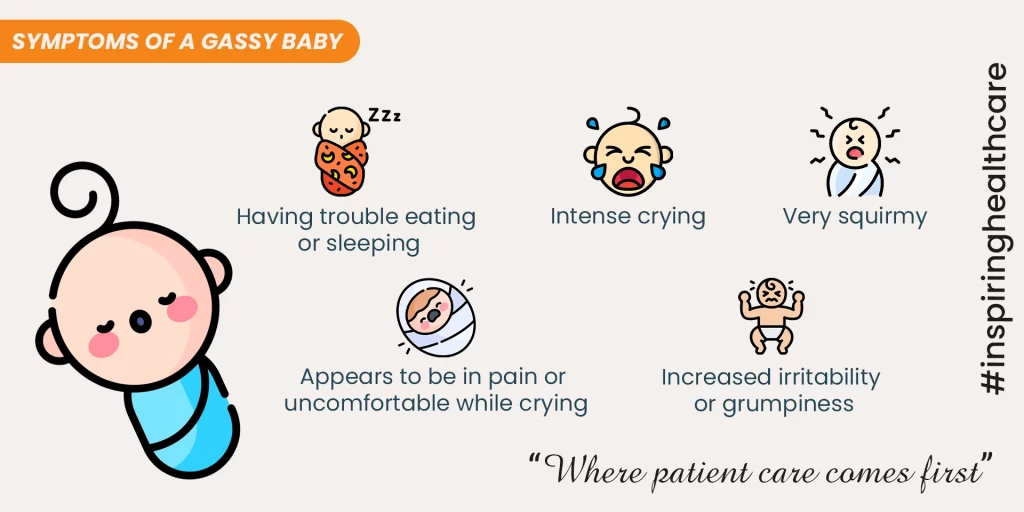Medically Reviewed by: Dr. Sonali M Pandey– DCH, MBBS, DNB Paediatrics
Newborns bring joy and excitement to families, but they may also experience common challenges like Newborn Gastric Problems. For Indian parents, understanding these issues is essential for their baby’s comfort and well-being. Newborns can experience gastric problems like gas discomfort, which is common and can affect both breastfed and bottle-fed babies. Gas pain is particularly bothersome in newborns and young infants due to their developing digestive systems. In this article, we’ll explore the symptoms and effective tips to ease Newborn Gastric Problems, helping parents navigate this common concern with confidence.
How do I know my newborn is having a gastric problem?
Here are some signs and symptoms that may indicate your newborn is having a gastric problem:
Spitting up or vomiting
It’s common for babies to spit up milk during or after feedings due to their underdeveloped sphincter muscles, which regulate the passage of food in the body. However, if your baby is forcefully vomiting or spitting up large amounts of milk after most feedings, it could indicate stomach issues.
If you notice frequent vomiting, especially if the vomit is green or discolored, or if your baby seems uncomfortable, it’s essential to seek immediate medical attention from their pediatrician.
Diarrhea
Newborns who are formula-fed typically have yellow, formed bowel movements occurring once or twice a day, sometimes more. Breastfed infants, on the other hand, produce soft, seedy, yellow-green bowel movements several times a day, occasionally as frequently as every few hours during feedings.
Diarrhea in babies is characterized by frequent, watery bowel movements, which can swiftly lead to severe dehydration and require immediate attention. Additional indicators of diarrhea include:
- Presence of mucus or foul odor in stool
- Lethargy (less active than usual)
- Decreased appetite
- General signs of illness or fever
If your baby undergoes a change in bowel movements or exhibits any of these symptoms, it’s crucial to consult your pediatrician promptly.

Hiccups
Hiccups in babies are a regular occurrence and typically pose no cause for concern. However, in some cases, persistent hiccups may signal underlying gastroesophageal reflux, causing discomfort and distress for the infant.
If you observe your newborn experiencing frequent hiccups accompanied by signs of fussiness or discomfort, or excessive crying or arching of the body it could indicate digestive problems requiring attention.
Colic in Newborns
Colic is a condition that can affect healthy newborns, typically striking between 3 to 4 months of age. It brings about persistent and inconsolable crying, often lasting for several hours daily, which can be incredibly challenging for parents to manage. Typically, it emerges around three weeks after birth, reaches its peak at about six weeks, and gradually diminishes when the baby is three months old.
Several factors may contribute to a baby developing colic:
- Adjustment to the new world and parental care.
- Immature digestive system.
- Imbalance of healthy bacteria in gut.
- Sensitivity to gas or infrequent burping/overfeeding
- Allergy or intolerance to cow’s milk-based formulas.
Also Read: Tips for Strong Mother-Baby Bond: First-Year Essentials
Recognizing and addressing these factors can help parents better understand and manage their newborn’s colic episodes.
Reflux
Reflux, a condition where stomach contents flow back into the esophagus, can lead to irritation and discomfort in some babies. This often results in excessive spitting and choking during feedings.
In severe instances, when stomach contents regurgitate into the esophagus, babies may vomit and inhale the contents into their lungs. This can manifest as rattling or wheezing sounds in the baby’s chest and back, potentially necessitating medical intervention.
Abdominal distension
In newborns, it’s normal for their bellies to look a bit bigger after eating. However, their abdomen should feel soft when they’re not feeding. If the abdomen feels hard or if the baby is cranky and hasn’t had a bowel movement in 1-2 days, it might be due to gas, constipation, or a more serious digestive issue.
Tips for Relief
Soothing Newborn Gastric Problems: Effective Solutions Discover practical methods to ease your baby’s gastric discomfort.
- Burping Techniques: Ensure proper burping during and after feedings to release swallowed air, minimizing gas buildup.
- Dietary Adjustments:
- Breastfeeding: Consider eliminating dairy, caffeine, onions, cabbage, and spicy foods from your diet, as they may trigger gas in your baby.
- Formula Feeding: Consult a healthcare provider to find the most suitable formula, especially if your baby has a milk allergy or lactose intolerance.
- Positioning for Gas Relief:
- Left Side: Gently roll your baby onto its left side while cradling it.
- On the Back: Lay your baby on their back and gently move his or her legs in a cycling motion.
- Tummy Time: Allow your baby some time on their tummy to aid digestion and relieve gas.
- Massage: Delicately massage your baby’s tummy and body to help them relax and potentially ease gas passage.
- Consult Healthcare Providers: Seek guidance from healthcare professionals for personalized advice on managing newborn gastric problems effectively.
- Baby Gas Drops: Consider using baby gas drops containing simethicone to break up gas bubbles and provide relief
- Probiotics: Discuss the use of probiotics with a pediatrician to support gut health and possibly reduce gas in babies.
By integrating these strategies, parents can alleviate their newborn’s gastric discomfort and enhance overall well-being.
Wrapping Words
Newborn gastric issues can pose challenges for both infants and parents alike. However, with attentive care, these symptoms can be alleviated. Observing your baby’s cues and watching for signs of discomfort is crucial.
If you suspect your baby is struggling with gastrointestinal problems, don’t hesitate to seek guidance from a pediatrician at Sanjivini Super Speciality Hospital in Lucknow. Their expertise can provide invaluable support and advice tailored to your baby’s needs.
Keep in mind that every baby is unique, and some may experience digestive challenges for longer periods. With patience and attentive care, you can help your baby feel more comfortable and thrive.
Sanjivini Super Speciality Hospital Has A Team Of The Best Pediatricians In Lucknow.

